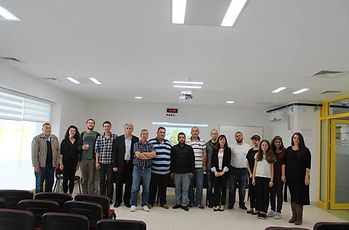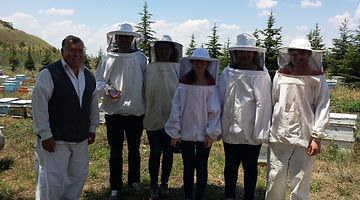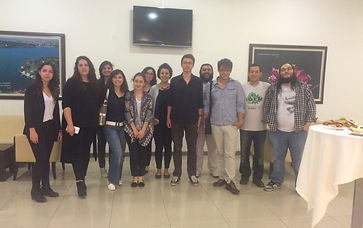
METU HS Ankara 2015 Team
VARROA CULA


Integrated Human Practices
As METU HS Ankara iGEM Team, we wanted to do something for Turkey’s agricultural and livestock activities.
First of all, we thought about bees since they are one of the major organisms of ecosystem because of their role on pollunation, food chain and sustainability of life.
Then, our team went to Ankara University to visit Prof. Dr. Irfan Kandemir. We asked some questions about bee, honey and his studies. He informed us about bee diseases. Then we searches about american foulbrood and varroasis. We noticed that varroa is an environmental problem.
We read numerous articles about varroa. As a result of long challenges, our project established on repelling varroas by synthesizing essential oils. Later on we organized a Beekeepers Meeting in our school and we represented our project to the guests; they appreciated our works towards this problem which concerns both Turkey and the world.
We were received both positive and negative answers to what we questioned to them in general.
Most of the beekeepers stated that they would use our solution, they would even advertise that solution to other beekeepers. In contrast, two of our guests who were beekeepers had concernes towards GMO’s, so they expressed that our solution may cause problems about biosafety, sustainability, social justice, security and environmental impact . They thought about GMO’s and from their perspective the project we did can be hazardous for environment, for them and for bees.
First they expleined their fears about GMO’s, as a lot of people they thought GMO as a bad thing. We explained them what really GMO means and we told them the good sides of it and also we talked about our project won'tgive harm to honey, bee or nature. It wasn’t easy to convice them but as they told everthing about bees; we told them about their questions. Then we told them about kill-switch mechanism. They didn’t even convince about kill switch organism. They thought that it would be very dangerous for the bees, hive and yield of honey; we can’t be sure. We can say that they didn’t understand synthetic biology’s logic in general. It’s a solution which is really far from their lives.
Furthermore, when we were chatting with them we also realized and got educated about a lot of things about the drugs they use for destructing varroas. There are several drugs that are effective on varroa parasite.
But they also have not a feature to end varroa parasite in hive eternally. So they can easily say that the pharmaceutical sector about varroa is not only restricted in Turkey. It is a major problem worldwide. Also, they mentioned that they are following the news about drugs which are useful for destructing varroa. They prefer to use; Apivar, Bayvarol, Perizin and Checkmite+. However, they also observe the process which the drugs produced in abroad countries reaching to Turkey. The price of newly manufactured drugs is really important for them. The drugs used against Varroa are imported they are very expensive and not easy to find as beekeepers declare.
For instance the drug called APIGUARD is 95 and APILIFE is 135 liras, making difficult to reach for a beekeeper. Also the beekeepers complain about the drugs being inefficient. The inconclusive drug causes to kill more bees hence the source of income of the beekeepers directly affected in negative way. They choose the drugs which have high impacts on varroa. Varroas mustn’t acquire a resistance to these drugs or methods quickly. They talked about the process of delivery and introducing of the developments in Turkey is a little long. Moreover, we talked about it will be delivered as a pill to the public especially to the beekeepers. Since we’re transforming cinnamyaldeyhyde to cinnamyl alcohol; economically, we did an approximately 50% decrease in price. And the users safely dispose of our product, once they are finished using it by kill switch organism.
For many years they are using drugs they knew. So, we can’t be persuasive. The beekeepers said that there is no treatment that dissolves Varroa eternally. That’s why there is always a threat for their hives. There are several drugs that beekeepers use to take precautions for Varroa such as Apistan and Bayvarol. Also there are some chemicals like oxalic acid and formic acid. On the other hand these treatments have some harmful effects. Like, chemicals decrease the efficiency and quality of the honey. The medicines can cause death of bees. These facts of the beekeepers methods of course decrease their yield. As an illustration, the owner of Ankara Beekeepers School, Kursad Ceseroglu lost his 92 bees out of 100 because of the Varroa mite. He said that the only source of income vanished suddenly. That is why the production rate of honey decreased sharply. He barely could revert the situation of the hive. Even the hives have been recovered still the Varroa is a threat for him. And, Yaşar Tekin said that he had a decrease of honey yield about 200-500 kg. At that point, listening their experiences are really enjoyable for us.
We did a survey to them about their beekeeping life and their ideas about our project. We recognized that all of our beekeepers guests experienced the parasite; varroa. They had some challenges with varroa; using chemical and natural drugs and acids. As we said; the beekeepers who are find our project not useful said that the drugs they use are enough for the treatment. Briefly, they didn’t trust project for many points. On the other side, the beekeepers who thought our project will be a good technology for the varroa treatment confessed that the drugs they use are notenough. From our 7 beekeeper guests; 5 of them approved our project. In conclusion, it’s a great experience for us to chat with the beekeepers and get some ideas for developing our project. We asked that if we did something in our mind and get the certificates that are saying it is reliable, harmless and have a high quality for destructing varroas; do you want to buy it? Most of them said yes without thinking for one second. Also we improved ourselves to present an idea and our the ability to convince. Finally, it’s a great day full of discussion, brain-storming, sharing ideas and advices.




Open Event/ Beekeepers Meeting
We hosted Prof. Dr. Ender Yarsan and beekeepers to introduce our Project on 13th of June 2015. We asked some questions about their point of views on drugs and their lives with bees. Firstly, they talked about how they became a beekeeper. For most of them beekeeping is a family bussiness. It is passed to them from their fathers and some of them still work with their family. Beekeeping progresses in a master and apprentice style. While learning their job they all had lessons from masters and developed throughout the way. Even though the work is difficult they see beekeeping as a privilege an extremely fruitful job. This is why among them there are people who are intersested in beekeeping as a productive hobby. Secondly, we chat about the drugs they use for varroa treatment. There are multiple active ingredients used throught the world in order to treat varrosis; however the medicine in Turkey quite narrow and limited.
After we represented our project to the guests, they appreciated our works towards this problem which concerns both Turkey and the world. We were received both positive and negative answers to that question from them. Most of the beekeepers stated that they would use our solution, they would even advertise that solution to other beekeepers. In contrast, two of our guests who were beekeepers had concernes towards GMOs, so they expressed that our solution may cause problems about biosafety. They thought about GMO’s and from their perspective the project we did can be hazardous for environment, for them and for bees. For many years they are using drugs they knew. So, we can’t be persuasive. The beekeepers say that there has no treatment that dissolves Varroa eternally. That’s why there is always a threat for their hives. There are several drugs that beekeepers use to take precautions for Varroa such as Apistan and Bayvarol. Also there are some chemicals like oxalic acid and formic acid. On the other hand these treatments have some harmful effects. Like, chemicals decrease the efficiency and quality of the honey. The medicines can cause death of bees. These facts of the beekeepers methods of course decrease their yield.



Field Trip to Beekeeping School
On 06th of June 2015 we visited Angara Beekeeping School and it’s owner Kursad Ceseroglu. First of all he made an introduction to beekeeping and briefly indicated beekeeping meterials. He mentioned about the diffuculties that beekeepers faces and how important his bees are. He told us some facts about bees like once a bee goes to collect pollen it has to pench 50-100 flowers. Later on he offered us some pollens to eat which was organic. Secondly we discussed about the Varroa and learned that he used oxalic acid for treatment. We examined the mite interactively and talked about differences between male and female mites. By dressing up as a beekeeper we had the chance to see open hives and collect some Varroa mites and bee larvaes for behaviour experiment. Also we obtained a piece of bee wax and propolis. According to him if we can reach success beekeepers would be very satisfied. In conclusion by this field trip we achieved to see the organisms issued in every paper we read. Also we had the opportunity to collect some samples for the behavioral test and enlarged our knowledge.


Meet-Up
On May 24 2015 we participated a meetup that ATOM’s organized. This meetup included METU, METU HS, AUC and ATOMS teams. First we were given information about IGEM. Each team introduced themselves and presented their own project. For us it was a great experience because we made a presentation for the first time as METU HS 2015 team. We also presented our last year project , human practises in our school and this year’s project. We gave a certificate for who achieved to say "Hydroxymethylfurfural" for 3 times. After presenting our project we answered some questions from other participants. Thus we became prepeared about possible questions. Between presentations Burak Yilmaz, the CEO of Sentegen made a speech. He is one of the ex-participants of iGEM. He talked about sponsors which can be hard to find when they participated. He mentioned the disabilities of making science in Turkey. At the breaks we talked with other teams about iGEM and the process about their experiments. With this meetup we contacted face to face with other iGEM teams in Turkey, we made great friendships and also we helped eachother. We understood how hard are finding a sponsor , finding the chemicals to use and especially finding a creative idea which never used. We learned and showed that our idea is creative, exacting but can be an achieved idea. This meetup contributed us in many ways.

Tree Planting Day
Our school joined to a tree planting activity on 20 May 2015 which was organized by METU. We were there as METU HS iGEM team. We planted a tree for iGEM and our team. While we were planting we carried our logo with us. We introduced iGEM to studends and also we contributed to the environment. This was a step for introducing our project and environmental issue to other people. Also we underlined the importance of planting for pollunation. Since bees constitute one third of human food by pollunition, people should plant more often and be aware of bees.


Our team went to Ankara University to visit İrfan Kandemir. He graduated from Middle East Technical University, Biology Department in 1991 and he worked on various projects about the honeybee Apis Mellifera. He still continues to publish articles on this topic in scientific journals like Apidologie and Journal of Apicultural Research , Journal of Apicultural Research .We went his office to ask some questions about bee, honey and his studies. He politely answered all of our questions and informed us. He guided us about our project and gave some information about honey bee diseases.
Meeting with Prof. Dr. Irfan Kandemir

Bright ideas come from filled stomachs. By this motto we organized a bake sale at our school to introduce our team and iGEM to our school and had a great time. We made DNA cupcakes, cookies and cakes. Also we earned a little bit of money to raise the team budget.
Bake Sale

Idea Box
For us finding solutions for people’s challenges and making their lifes easier is really important. That’s why we wanted to hear their problems from them and created an Idea Box.
We put two boxes to our school and heard student’s and teacher’s voices. We also dressed like bacteria and talked to people about iGEM. Later on we chose the best three ideas and gave them awards to encourage. Thus we also achieved to introduce our team and iGEM to our school.